Sweat was beading up on my forehead as I tussled with the shoulder straps of my waders. Then the zipper. Then the goddamned wading belt. I uttered every iteration of the mother of all swear words, beginning it with the usual prefixes and ending it with all sorts of creative suffixes as I hurried to de-wader on the banks of Chile's pastoral Palena River.
I groaned in agony. My gut seized. As emergencies go, this was about as urgent as it gets on the river without life and limb at stake.
"Son of a ..." I swore. The waders finally fell to my ankles and I hurriedly dropped over the log.
The relief was immediate. The cramps dissipated as what was once causing intestinal havoc on the inside was suddenly and innocuously on the outside, amid a foul, fetid rush. But those harried few minutes before and after we beached the boat so I could scramble off into the flora were downright hellish. Gut-punch pain. Chills. I dared not try to sneak a fart by—lesson learned.
The visceral nature of this simple act hit me. Here I was in the rain-soaked Andes amid some of the best trophy trout fishing on the planet and my biggest worry was where I was going to take a dump. Days of suffering through a gnarly stomach bug were behind me, and I was, legitimately, on the mend. But I wasn't out of the woods just yet, not if this ungainly episode was the barometer by which I'd measure my healing process.
More Like This
Days before, as we rode from the lodge at Lago Yelcho higher into the Andes to the swank Uman Lodge, which sits atop a ridge overlooking the Futaleufu River, I knew something was amiss.
"You mind turning the AC down?" I asked the driver as we pulled into the little village of Futaleufu. I was freezing. Shivering. After a bit, I recognized that I had the makings of a pretty lively fever. But I refused to actually be sick, not there, not thousands of miles away from home in a distant land. Not the day before I was to chase monster browns and rainbows in the storied river that shares the name with the town.
No. Not here. Not now.
I powered through dinner—I even ate a little. But after dinner, I knew it was too late. I knew that I was in the grips of this bug, whatever it was, and that resistance was futile. I knew this was serious. I knew that I'd never fish the Futaleufu. And, in the moment, sensing what was to come, I didn't care.
The next morning, I remember rolling over in my bed, and telling Chad that there was just no way I could go. The memory is blurry, and the words were uttered through a fevery state of semi-consciousness. I'd spent the night walking gingerly across the suite—and it was posh, with a floor-to-ceiling window overlooking the river and the distant Andes—to the bathroom and back, wondering exactly how much I'd actually eaten the night before versus how much was ending up in the crapper. And, of course, those chills had manifested into a full-on fever-enhanced virus. My head ached. I was nauseated. The act of pulling back the covers in order to get out of bed to make it to the toilet was exhausting. Walking 30 feet across the floor felt as though I was tackling a marathon.
And there I'd sit, for 15, 20 minutes at a time. Each time I thought there was nothing left, another burst would erupt.
I forced water down my throat, knowing full well that I might as well be dumping it down a straight pipe, but also knowing the dehydration would slow my recovery time, if, I thought, I was to recover at all. I won't lie. The thought crossed my mind; there are worse places to die and worse ways than to expire while staring out at the Andes after a week spent casting to and catching massive, lake-dwelling browns and rainbows.
But the cause of death would have been intolerable.
"I'm sorry," I imagined Chad lamenting over the phone to my family back home. "But it appears he shit himself to death."
The staff at the lodge delivered a clear barley broth that first afternoon, and I sipped it slowly, knowing full well that it'd be just as productive if I just flushed it directly. They were quiet and understanding. They oozed empathy.

The next day was a lot like the first. Fishing was out of the question. The fever hit its peak. More chills. More high-quality bathroom time. Finally, the lodge manager insisted that I go to the hospital.
"The hospital?" I asked. "I just need some ibuprofen and some Gatorade."
But he wouldn't have any of it. Within the hour, I was strapped into an SUV and on the way into Futaleufu with a lodge employee, a young woman from Santiago who spoke quite a bit of English. She was, like all the lodge staff, very kind and sympathetic. As the car bounced down the mountain, I was certain that I wouldn't make it before the urge struck again. Every time I grimaced, she put her hand on my arm.
"Just a little bit longer," she would say.
There comes a time when all the humor that surrounds a guy with the runs kind of goes out the window, and is replaced by honest-to-God concern. Also, I wasn't kidding myself. The lodge's SUV was immaculate, and she and I both wanted to make sure it stayed that way.
As my host escorted me through the sliding front doors of the modest building, I noticed that same institutional sterile smell you get whenever you enter a place where cleanliness is absolutely vital—schools, clinics … my mother's guest bathroom. Heavy on the bleach. The floors were worn, but spotless. The walls were a bright, lime green and lined with small chairs that might have been more at home in your average third-grade classroom.
When I took one of the tiny chairs, my knees were at my chin. The fever chills had set in again, and I was exhausted. I leaned back against the green wall, closed my eyes, and drifted off. I drifted into a state of semi-consciousness, and found myself not in a foreign hospital, but in a contentious parent-teacher conference, where I was facing down a snooty grade-school math teacher for not being able to help my kid well enough with his fractions.
"Listen, lady," I imagined myself saying to the dour, bespectacled educator, "I got my 'C' in college algebra, dropped the mic and marched my happy ass over to the English department. You're the math teacher, here. You tell me what the plan is."
My driver tapped me on the shoulder, bringing me out of my little half-conscious stroll.
"Are you ready?" she asked. I nodded.
In literally three minutes, I was admitted. I gave them my name, showed them my passport and was soon lying supine in a hospital bed, my feet, ankles and half my calves hanging over the end. The lime-green walls seemed nuclear, brightened by a single bare light bulb on the ceiling."Español?" the doctor asked.
I put my thumb and my forefinger close together in front of my face and said, half-heartedly, "Poquito." And then, hopefully, I asked, "Anglaise?"
"No," the doctor answered definitively.
We both instinctively looked at my driver who had suddenly become my interpreter. The doctor wanted to know what was wrong, and I tried, tactfully, to tell my new friend from the lodge that I was about to crap my pants. Again.
She nodded and giggled a little bit and then proceeded to describe my symptoms to the doctor.
I nodded, too, as if I could actually understand the rapid Spanish being delivered. "Poquito" in my estimation, means, "Not a goddamned word." She stopped talking, and the doctor said a few words to her. She nodded and then turned to me.
"You're very dehydrated," she said to me. "They will give you fluids. You also have a … how you say … stomach flu. A virus. They will give you medicine."
I nodded, and both the doctor and the interpreter walked out of my little cordoned off hospital room. More Spanish continued between the two, and the woman came back in.
"I'm going to run some chores," she said to me in her accented but very solid English. She very nicely put her hand on my arm and said, with certainty, "They are going to take good care of you. I will be back to get you."
And there I was. Alone. In a Chilean hospital. And I felt like hell.
I drifted into a fitful half-sleep, urged on by the fever, no doubt, and imagined Chad bouncing along the rain-swollen Futaleufu, boating massive browns that chase streamers like fat kids chase the ice-cream truck. I could see his gleeful face, hear his giggles in tune with the whine of his his fly reel as two-foot-long brown trout repeatedly dived into the green depths of the river before succumbing to the net.
"I f**king hate that guy," I mumbled, shifting my weight and listening to the little bed creak and groan under my weight.
"Que?" I heard a voice directed at me. I opened my eyes and another diminutive Chilean had entered my protected little virus realm. He was armed with a clear bag of saline and a tray full of the needed equipment to administer an IV. There was rubber tubing everywhere.
I sat up a bit to help the nurse find the vein. He stuck me twice, once in the crook of each elbow, only to find a dry hole both times. I was so dehydrated that my veins were tight. He left briefly and came back with another nurse and together, after chatting back and forth, presumably about the massive American that lay in their undersized hospital bed refusing to give up a vein, they brought in a third nurse.
This, I thought, is what Gulliver must have felt like when the Lilliputians swarmed him and tied him up.
We finally found a vein on top of my left hand, and the saline started dripping. My nursing entourage left me to my own devices, and after half an hour or so, the first nurse showed up with a second bag.
Yeah. I was dehydrated, all right.
I honestly felt like a new man as I walked out of the hospital with the driver from the lodge. Two full bags of fluids were coursing through my bloodstream, and I had an antiviral prescription in my pocket, as well as a couple of little packets of powdered hydration salts (See? I knew I needed Gatorade). Every time I pulled my wallet out, I was told there was no charge. Chile's very civilized health care system offers access to clinics, hospitals and medicine via taxes deducted from payroll. I'm no health care expert, but how could I possibly complain about that?
For better or worse, I donned waders the next day, strung together a couple of fly rods and manned the stern of the boat with a purpose. After missing the Futaleufu, I was excited to get back to fishing. I hadn't traveled half a world away to duck-walk back and forth to a hotel shitter.
And I did OK for a bit. I'd fish for a few minutes and then sit for a few, just to make sure I wasn't expending all of the limited supply of energy I'd managed to regain after the viral episode hit its crescendo the day before. I caught a handful of fish—nothing huge, but a few browns that pushed 18 inches or so. I was happy and back in the fishing zone. All was right with the world.
And then the virus hit me again, as if it was simply reminding me that, while I might have it on the run (no pun intended), it still had a sortie or two left in it. I toughed it out as long as I could, but finally broke down and told Chad and Adrian that we needed to beach the boat for a quick pitstop.
And there I squatted, shielded from the boat in hip-high flora, waders around my ankles feeling as though I hadn't an ounce of energy to spare. And, of course, I had no paper—had I waited an extra instant before leaving the boat to grab even a napkin, I have no doubt I would filled my waders and ruined everyone's day. There wasn't much within grabbing distance, either, and the last thing I wanted to do was crab-walk across the gravel bar with my waders around my ankles in search of handful of leaves I could use to reasonably clean up.
I started rifling through my jacket, hoping for some miracle. Nothing. Then I checked the pockets of my waders. There, in the little plastic ziplock pocket were several sheets of paper—last year's fishing licenses from Idaho, Colorado, Montana and Yellowstone National Park.
Miracle delivered.
"You OK, buddy?" Chad asked from the bow of the boat. I'd gotten back in the craft, but I wasn't quite ready to stand and fish. He boated another nice brown attached to the meat whistle he was throwing at the banks. "You're looking a little peaked."

I smiled a wilted grin. I never really stopped to consider what it must have been like to be my fishing partner over the last four days. The whole point of this adventure was to chase big trout and tell stories about it. Meanwhile, his buddy was lying in the fetal position in a 5-star hotel suite praying for a quick death. Now, with his recovering pal back in the boat, and with some honest-to-God good fishing at hand, who could blame him for being a bit chatty?
"I'm good," I said. "Just a little drained. I'll get back on the horse here in a bit."
As I sat clenched in the stern of the boat, Chad boated another 22-inch brown.
I looked up from my misery at his giggling mug and smiled. But inside, I hated him. Inside, all I wanted to do was stand up, grab a fly rod, snap it in half and shove the sharp end into his neck.
He connected with another fish. He giggled some more. Adrian manned the net, and a big, gorgeous 24-inch brown came to hand. I grinned through the pain and gave him the "thumbs up."
"Way to go, pal," I said. "That's a sweet fish." On the inside, though, I was seething.
"I f**king hate that guy," I murmured to myself. That grin. That giggle. That unbelievably massive fish. Ugh.
I fought back another wave of abdominal pain, and put the beer on the bench seat.
I grabbed a fly rod.



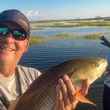

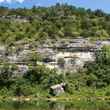
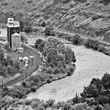


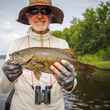
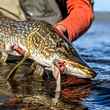
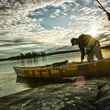


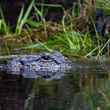

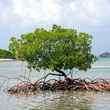


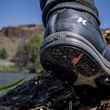
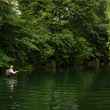
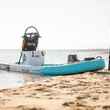
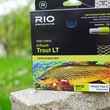

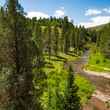
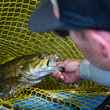
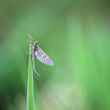
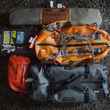
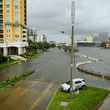
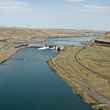
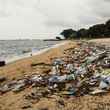
Comments
Visitor replied on Permalink
Too funny.
Pages